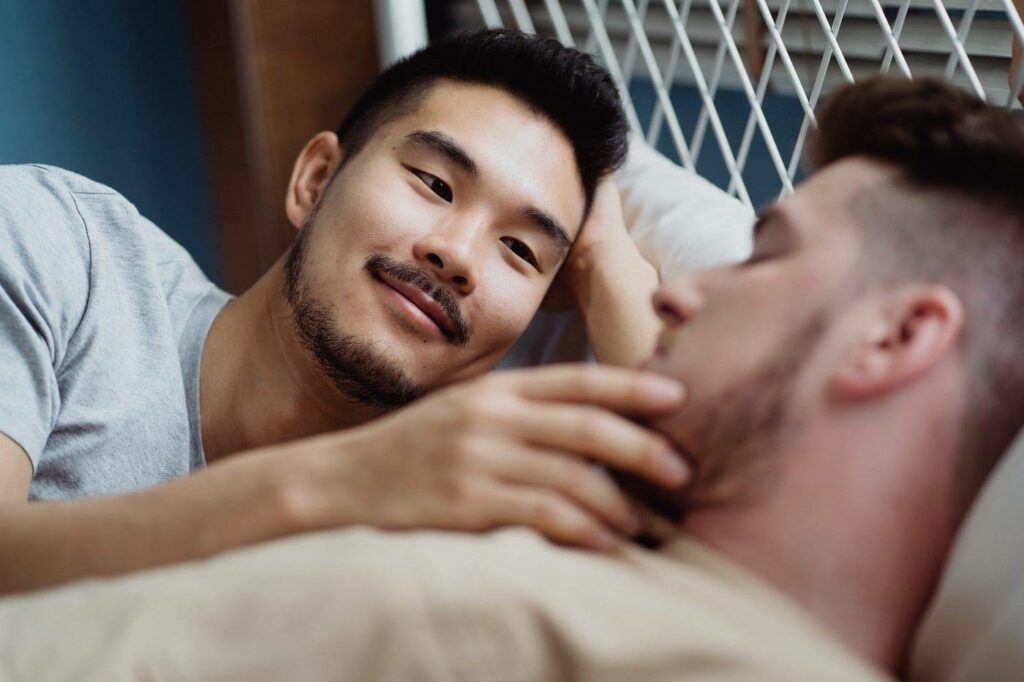Every relationship, no matter its composition, requires care, understanding, and commitment to ensure its longevity. It’s paramount to recognize the value and necessity of specialized resources that address unique experiences, including those of the LGBTQ+ community. In this blog post, we aim to discuss the gay marriage therapist, their role, and the techniques used by them to help gay couples build a strong foundation for a lasting, fulfilling marriage.
Contents
When Should I Consider Gay Marriage Therapists?
 Seeking professional help in the form of a gay marriage therapist is a proactive step toward addressing any issues or concerns within your relationship. It’s important to remember that seeing a therapist doesn’t necessarily mean that your relationship is in a crisis.
Seeking professional help in the form of a gay marriage therapist is a proactive step toward addressing any issues or concerns within your relationship. It’s important to remember that seeing a therapist doesn’t necessarily mean that your relationship is in a crisis.
On the contrary, many couples choose to engage with a therapist as a preventative measure to strengthen their bond and enhance communication. Here are some key situations where you might consider seeing a gay marriage therapist:
- Pre-Marital Counseling
Prior to getting married, it can be helpful to seek counseling. This gives couples an opportunity to discuss important issues like finances, children, work-life balance, and other long-term goals.
- Communication Difficulties
If you and your partner consistently find it difficult to effectively communicate or resolve disputes, a therapist can provide the tools and strategies you need to improve this vital aspect of your relationship.
- Changes in Relationship Dynamics
Major life events, such as moving, changing jobs, or losing a loved one, can alter the dynamics of a relationship. A therapist can help navigate these changes and ensure the relationship remains strong and healthy.
- Decreased Intimacy or Satisfaction
If you or your partner feel emotionally or physically distant, unfulfilled, or dissatisfied in the relationship, a therapist can help you both reconnect and rebuild intimacy.
- Infidelity or Trust Issues
Experiencing a breach of trust, including infidelity, can be devastating for a relationship. A therapist can facilitate healing, forgiveness, and rebuilding of trust.
- Navigating Identity and Acceptance Issues
For gay couples, societal discrimination, family acceptance, and personal struggles with identity can pose unique challenges. A specialized gay marriage therapist can help you both navigate these issues, while also working on your relationship.
How They Can Help In Unique Challenges Of Gay Couples?
 Gay marriage therapists are specialized professionals who understand the unique set of challenges that gay couples may face. Here are some ways in which a gay marriage therapist can help:
Gay marriage therapists are specialized professionals who understand the unique set of challenges that gay couples may face. Here are some ways in which a gay marriage therapist can help:
1. Managing Stigma and Discrimination
Unfortunately, prejudice and discrimination are still prevalent in many parts of society. And they can significantly affect the mental and emotional health of gay couples. Therapists can provide coping strategies for handling such issues and offer support in situations where stigma is experienced.
2. Navigating Coming Out
Coming out to family, friends, and colleagues can be a daunting process. A therapist can offer guidance on how to approach this delicate process and provide support in the aftermath. That might include dealing with potential negative reactions.
3. Family Acceptance
Not all families are accepting or supportive when a member comes out as gay. A therapist can help couples deal with rejection or lack of understanding from their families, as well as provide strategies for fostering a dialogue of acceptance and understanding.
4. Parenting Challenges
Gay couples may face unique hurdles if they decide to become parents, including societal attitudes, adoption or surrogacy processes, and others. Therapists can help navigate these complexities and offer guidance and support in becoming a parent.
5. Relationship Dynamics
As with all couples, gay couples can experience relationship difficulties, such as communication problems, conflict resolution, intimacy issues, and more. A gay marriage therapist will provide tailored strategies to manage these dynamics within the specific context of a gay relationship.
It’s important to remember that every relationship is unique and not all gay couples will face these challenges. However, having a therapist who understands the potential for these issues and knows how to address them can be incredibly beneficial.
What Is The Role Of Gay Marriage Therapist?
 A gay marriage therapist plays an integral role in helping couples navigate the intricacies of their relationship. Here are some of the key roles a gay marriage therapist plays:
A gay marriage therapist plays an integral role in helping couples navigate the intricacies of their relationship. Here are some of the key roles a gay marriage therapist plays:
Facilitator of Communication
One of the main roles of any couples therapist is to facilitate open, honest, and constructive communication between partners. This includes helping couples articulate their thoughts and feelings, understand each other’s perspectives, and effectively manage disagreements.
Problem Solver
When couples face challenges or disagreements, the therapist assists them in identifying the root causes of these issues. They then guide them in developing strategies and solutions to resolve these problems, fostering a more harmonious relationship.
Educator
A therapist provides valuable education to couples about healthy relationship dynamics. They teach skills such as effective communication, conflict resolution, emotional regulation, and other key aspects of a successful relationship.
Guide for Personal Growth
Therapists help individuals grow within their relationships by assisting them in understanding their behaviors, emotional responses, and relationship patterns. They facilitate self-awareness and personal growth, leading to healthier relationship dynamics.
Advocate and Ally
As specialized gay marriage therapists, they serve as an advocate and ally for the LGBTQ+ community. They understand the unique societal challenges gay couples face and can provide support and resources for coping with discrimination, stigma, and other issues.
Support for Mental Health
If one or both partners are struggling with mental health issues, such as anxiety, depression, or the effects of stigma and discrimination, a therapist can provide crucial support, including therapy and referrals to other mental health professionals if needed.
By playing these roles, a gay marriage therapist can help couples build strong, lasting relationships. It’s essential to remember that the ultimate goal of a therapist is to provide the necessary tools for couples to navigate their relationships successfully and independently over time.
How To Find The Right Gay Marriage Therapist?
Finding the right gay marriage therapist can be a significant step in fostering a healthy and fulfilling relationship. Here are some steps and factors to consider when searching for a suitable therapist:
1. Credentials and Specialization
Ensure the therapist is licensed and has the necessary qualifications to practice. It’s also crucial they have specific training and experience in working with gay couples. You may also want to check if they are members of professional organizations that uphold ethical guidelines.
2. LGBTQ+ Affirmative
It’s vital to choose a therapist who follows an LGBTQ+ affirmative approach, meaning they acknowledge, respect, and value the identities and experiences of LGBTQ+ individuals. They should support and advocate for equality and inclusivity.
3. Personal Comfort
Therapy involves discussing intimate and personal issues. As such, you and your partner must feel comfortable with the therapist. Consider setting up a preliminary meeting to gauge whether you feel at ease discussing your concerns with them.
4. Communication Style
The therapist’s communication style should be one that both you and your partner respond well to. Some therapists are more directive, offering specific advice and strategies. While others may be more facilitative, focusing on guiding you to your own solutions.
5. Logistics
Practical matters are also important. Consider the therapist’s location, availability, session costs, and whether they accept your insurance.
6. Reviews and Recommendations
Online reviews can provide insights into other clients’ experiences with the therapist. Personal recommendations from friends or community members can also be invaluable.
7. Continual Assessment
Even after selecting a therapist, it’s crucial to continually assess whether they are the right fit for you. A good therapist should make you feel heard, respected, and comfortable, and you should see progress in the issues that you sought therapy for. If you don’t feel this is the case, it’s entirely acceptable to look for a different therapist.
Remember, finding the right therapist can take time. But it’s a crucial step in addressing relationship issues effectively and constructively. A good fit will create a safe space for open communication and growth, helping you strengthen your relationship.
Conclusion
A gay marriage therapist is not just a guide, but an ally and advocate, skilled in addressing the specific needs of gay couples. They provide a safe and affirmative space to explore relationship dynamics, communication issues, societal pressures, identity struggles, and more. By doing so, they empower couples to build stronger, healthier relationships, enriched by understanding and mutual growth.
Let’s continue to strive for a time when all relationships are celebrated and respected equally, where the need for specialized therapy is a thing of the past. Until then, know that the help and guidance you might need are available, and there’s no shame in reaching out.
Life may sometimes be challenging if you are gay, but Online Gay Counseling can help. Get experienced LGBTQ therapists at PrideMantra: Book a trial LGBTQ therapy session


